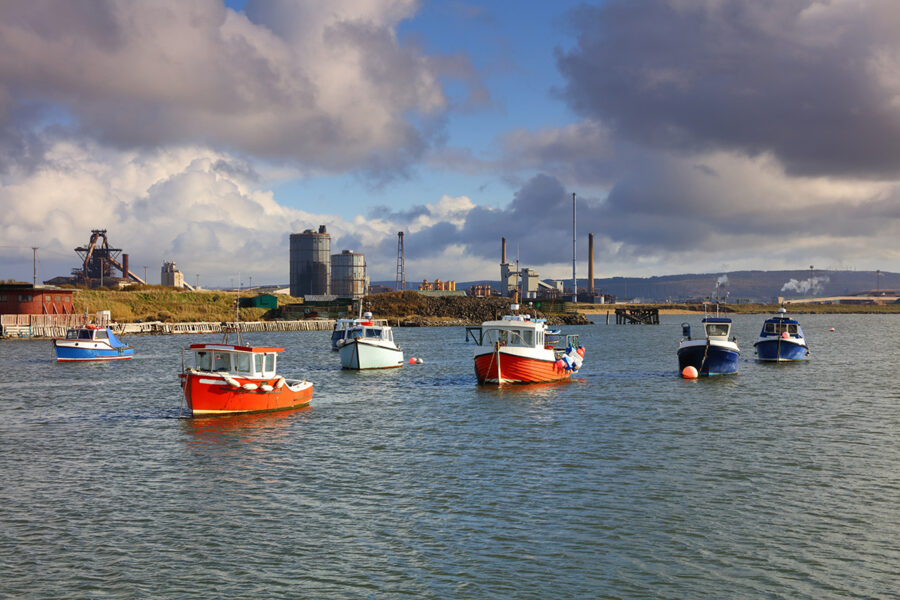Addressing displacement effect ‘needs joined-up thinking’
The growing spatial squeeze on fishing grounds and a failure to recognise the industry’s role in providing food security for the UK were key themes at a major conference last week, reports Tim Oliver.
Also highlighted at the conference were the looming displacement problem associated with spatial squeeze, a need for more ‘joined-up’ government thinking, and the need for much greater industry involvement in policy- and decision-making.
Delegates at the conference heard that spatial squeeze and its effects are a huge issue for the industry.

Elspeth Macdonald: “There would not be a great deal of sadness in Scotland’s fishing communities if the Bute House Agreement falls.”
“Displacement is a really big challenge for us. It’s disappointing it only merits two paragraphs in the Joint Fisheries Statement,” said SFF chief executive Elspeth Macdonald.
Chris Ranford, chief executive of the Cornish FPO, warned of ‘catastrophic displacement and many other unintended consequences’.
NFFO chief executive Barrie Deas said: “Spatial squeeze is probably a bigger threat than anything else. The ABPMer report last year commissioned by the NFFO and SFF showed that in the worst-case scenario we will lose access to about half our grounds, and in the best case we will lose about a third.”
The online conference was organised by the Westminster Food and Nutrition Forum on the theme of ‘Next steps for fisheries policy in the UK – Joint Fisheries Statement implementation, management plans and sustainability, trade and collaboration, and supporting industry resilence and competitiveness’. It heard calls for the closer involvement of the industry in policy-making, and in gathering scientific data to inform policies.
Elspeth Macdonald said that spatial pressure got ‘scant reference’ in the Joint Fisheries Statement (JFS) but was ‘a really major issue’ for the Scottish industry.
“It’s worrying that government is pushing ahead with policies that will increase displacement with so little prior consideration of how to manage it,” she said.
“It’s interesting that Defra says more work is being done now on this, and industry efforts have given that work more focus.
“We have concerns about many policies being developed at fast pace, that don’t always seem to have the same focus on the precautionary approach that we would normally expect – and that is applied to fisheries.”
She was critical of the JFS, which ‘oversimplifies and understates many key issues and challenges that can’t be taken in isolation from the wider policy landscape’.
It was ‘disappointing that the JFS didn’t take onboard more industry comment’, and didn’t give enough importance to the fishing industry’s contribution to food production, she said.
The JFS should be kept under review because the fishing industry was ‘very complex’ and operates in ‘a fast-moving environment’, she added.
Access issues
NFFO chief executive Barrie Deas said the future prospects for the fishing industry could be summed up in one word – access. This included access to fishing opportunities and fishing grounds; access to labour – ‘a big issue in some parts of the industry’; access to decision-making, particularly in relation to spatial squeeze and spatial planning, and to development of fisheries management plans (FMPs); and access to markets.

Acceleris PR – National Federation of Fishermen’s Organisations – PICTURE shows chief executive Barrie Deas – Corporate headshots for NFFO at their HQ in York North Yorkshire. (CREDIT Jonathan Pow/jp@jonathanpow.com)
Stressing the complexity of the industry and the environment in which it operates, he said previous assumptions about food and energy security ‘came tumbling down very fast’ as a result of the Ukraine war.
“Fishing is in the middle of the motorway in relation to several major political developments – relations with the EU, energy, fuel costs, decarbonisation, warming seas, plus displacement from offshore renewables are all external pressures on the industry.”
He said environmental politics often involved ‘one-dimensional’ solutions to problems that could be ‘really unhelpful’.
“The reality is that because of the complexities we need trade- offs – and I emphasise those two words. They are really at the heart of what is needed going forward.”
He stressed the need for ‘joined-up’ government thinking in the face of the complexities and challenges facing the industry, and for the industry to have better access to decision-making.
The Fisheries Act and JFS provided a framework for more ‘agile and adaptive’ fisheries management in the future, and there was more scope for the industry to be involved in drawing up FMPs, although this was ‘a mammoth task’, he said.
Barrie Deas said there was ‘a hierarchy’ of challenges ahead, but spatial squeeze was the most serious.
“Fishermen are not like farmers – they have no legal title to their production areas – and I think we need as a matter of urgency to find a way to protect access to those areas.
“The key to getting that right balance is understanding the role that fish and fishing grounds play in providing food security. That’s the way to develop the right safeguards and protections that are necessary to secure our future.”
Food security
Chris Ranford stressed the importance of UK food security, and the need to protect this and the fishing industry from loss of grounds due to the expansion of offshore renewables and MPAs.
He said there was a ‘massive appetite’ for offshore renewable energy, and that it was vital for the industry to be at the table at the start of the marine spatial planning process.
“We must highlight what will happen to food security if this is not addressed,” he said.
The plans for big offshore wind projects in the Celtic Sea will be ‘a huge issue’ for all vessels working these grounds, not just Cornish and UK vessels, but also foreign ones, said the CFPO chief.
The cumulative impacts of these and restrictions on fishing in MPAs will increase displacement if fishing is not included much earlier in the marine planning process, he said. “The most worrying thing is that no one is asking the industry what it will do in the face of these displacement challenges.
“If we continue on the path we’re on, we’re going to face catastrophic displacement and many other unintended consequences.”
Seafood production areas
Leading fisheries scientist Professor Michel Kaiser from Heriot-Watt University also said that spatial squeeze was ‘a major source of concern’, and called for key fishing areas to be identified.
He pointed out that fishermen, like other businesses, needed certainty to give them the confidence to invest in the future.

Professor Michel Kaiser: “We should be turning our fishing vessels into smart platforms that are capturing and quantifying catch data.”
“We need to identify those areas which are important seafood production areas,” he said. “At the moment we are happy to identify which areas are fit for purpose for wind farms, tidal power and so forth, but nobody is talking about the necessity to identify key areas for fishing.
“We are talking about food production, and as we move forward and if we undermine our ability to produce food, it will be very difficult to wind that back once those areas are blocked.”
He also called for better use of technology to enable fishermen to fish more efficiently and selectively, and to make the industry more sustainable.
“We should be turning our fishing vessels into smart platforms that are capturing and quantifying catch data to better inform how we fish.
“The more efficient we can be in catching fish, the more it will improve profitability and improve environmental outcomes.
“We should spend more time catching fish and less interfering with the environment. We can only do that with data and information that needs to be fed back to the fishermen so they can fish with more precision.”
He said it was crucial that fishermen were involved in developing Fisheries Management Plans because they know what will work on the ground. Key to this will be ‘demystifying science’ so that bridges can be built between policy-makers, the fishing industry and scientists.
Professor Kaiser also urged caution when introducing HPMAs. “We need to be careful we don’t clash with other policies aiming to preserve the cultural heritage of fishing communities in local areas,” he said.
“We need to tread carefully – if we get it wrong we should be big enough to wind back and say on this occasion we made a mistake – we don’t want policies that conflict with each other.”
Industry ‘has lost trust in government’
“The fishing industry, as a result of Brexit, is extremely mistrustful of the legislation and the government, and there’s going to be an awful lot of hard work required to rebuild that trust,” fishing industry lawyer Andrew Oliver told the Westminster conference.
“Fishermen are not bureaucrats, or natural wordsmiths. They work on trust and personal relationships and for them actions speak louder than words, and I’d ask fishery managers to remember that.”
Bringing 35 years of wide- ranging experience of dealing with every aspect of fisheries legislation to the conference, Andrew Oliver said he wanted to add ‘a little touch of realism’ and talk about some of the issues ‘that come across my desk on a daily basis’.

Andrew Oliver: “I can see from my workload that fishers are under greater pressure than at any other time.”
He said the industry had been centre-stage during the Brexit process, but had gone from ‘hero to zero overnight’ when firm promises were broken and red lines crossed – for example, the failure to obtain an exclusive 12-mile territorial limit.
“But it’s not just Brexit. I can see from my workload that fishers are under greater pressure than at any other time. Spatial squeeze is reducing grounds, and there is no realistic compensation,” he said.
Compensation for loss of grounds in the early days of wind farms was acceptable, he said, but there were now cumulative effects as more as more grounds were being lost. “We are seeing fishermen forced out of areas, and seeing conflict between static and mobile gear when there was none before.” Fishers were not receiving the compensation they were entitled to, and were not receiving any assistance from the authorities to help with resolving gear conflicts, he said. Effort displacement was placing greater pressure on the marine environment, and there was an overall lack of co-ordinated marine spatial planning, which was not addressing food production.
Andrew Oliver told the conference that the Fisheries Act had not addressed issues of fisheries management structures. “It was maybe not intended to, but if you look at the IFCA/MMO model, would you have arrived at that model from a blank sheet of paper?” he asked
“We are trying to implement a fisheries regime against a system that is not ideal.”
A further pressure came from ‘the understandable desire’ to improve safety standards, but the MCA was too inflexible and inconsistent in the way it applied the regulations, he said. “What one inspector in the north of the country may regard as passing the requirements may not be the same an inspector in the south.”
Pressures from environmental NGOs were increasing, he said, and the UK government seemed less able to resist this than the EU had been. “Fishers see the reluctance of government to protect them, the increase in the power of the NGOs – for example, the government and authorities didn’t take a hard line on prosecutions over recent incidents of rock dumping, and indeed the court questioned whether it was proper use of public funds to prosecute.
“There is great mistrust in the industry.”
Andrew Oliver said a ‘joined-up’ approach was needed to marine spatial planning and fisheries management between the MMO, IFCAs, the Environment Agency and the other devolved authorities.
“We need a unified fishing industry that can’t be taken advantage of. We need to provide for fisher participation,” he said. “Overall the JFS may deliver, but it’s short on detail and ignores important issues.”
Scots industry ‘happy’ if Bute House deal ends
There has been speculation by political commentators that the resignation of Scottish first minister Nicola Sturgeon will see an early end to the Bute House Agreement between the SNP and the Scottish Green Party, which has been blamed by the Scottish industry for an increased bias towards policies favouring the environmental movement rather than the fishing industry.
SFF chief executive Elspeth Macdonald said the agreement ‘brought in some policies which caused some serious concerns’ and the industry would be ‘happy to see it go’.
“Many policies have emerged from it that are political rather than evidence- driven, for example the consultation on Highly Protected Marine Areas, where there are no clear stated objectives on what they are trying to achieve with them.
“There would not be a great deal of sadness in Scotland’s fishing communities if the Bute House Agreement falls.”
She was critical of the plan to introduce HPMAs to cover 10% of Scottish waters, saying they were ‘based on politics rather than science’ and that there was no clear scientific evidence to support them.
This story was taken from the latest issue of Fishing News. For more up-to-date and in-depth reports on the UK and Irish commercial fishing sector, subscribe to Fishing News here or buy the latest single issue for just £3.30 here.
Sign up to Fishing News’ FREE e-newsletter here.








